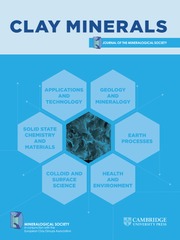Article contents
Mineralogical and physico-chemical characterizations of clay from Keur Saër (Senegal)
Published online by Cambridge University Press: 09 July 2018
Abstract
There is interest in exploiting and developing natural resources, particularly deposits of natural clays. Senegal has several clay mineral deposits for which chemical and mineralogical compositions have been little studied. Some of these natural materials are nowadays used in pottery and ceramics. To extend applications, a better basic knowledge is required and, for this objective, the raw clay and separated <2 μm clay fraction from Keur Saër (Senegal) were subjected to chemical and mineralogical studies. Several techniques including X-ray diffraction (XRD), thermal analysis (TG-DTA), Fourier transform infrared spectroscopy (FTIR), scanning electron microscopy (SEM), N2 adsorption-desorption isotherms, cation exchange capacity (CEC) measurements and solid state nuclear magnetic resonance (NMR) have been used to characterize the material. It was found that the raw clay and the separated clay fraction consist of a mineral mixture in which kaolinite is the main component. 29Si and 27Al MAS-NMR spectra show the presence of silicon atoms linked to three other silicon atoms via an oxygen atom and six coordinated Al atoms. Significant increases in the specific surface area and cation exchange capacity were observed on purification, reaching a maximum of about 73.2 m2g–1 and 9.5 meq/100 g for the separated fine clay fraction while the values for the raw material were around 28.9 m2g–1 and 7.3 meq/100 g.
Keywords
- Type
- Research Article
- Information
- Copyright
- Copyright © The Mineralogical Society of Great Britain and Ireland 2012
References
- 5
- Cited by


